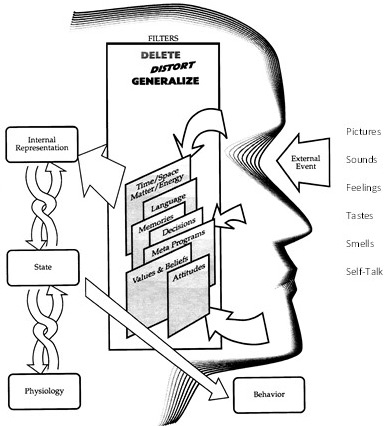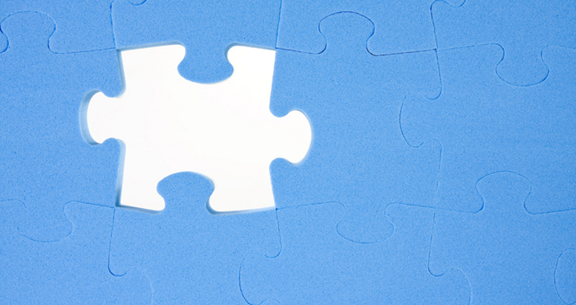All NLP people are familiar (or they should be if they really understand NLP) with the terms Internal representation (IR). But actually
What on Earth Is This?
For the untrained person not familiar with the NLP jargon it may sound bizarre -internal representations sounds almost like “internal hallucinations”.Well folks, this may not be as far from the truth as you think.
Technically, there are only six things you can do inside your head: see pictures, hear sounds, feel feelings, smell smells, taste tastes and talk to yourself. Five senses plus our internal self-talk. That’s all.
Check it out now!
What are you doing right now inside your head? Stop and check! That’s your internal representation.
But, your personal IRs are a form of internal hallucination and ,
Here Is Why
It has been estimated that we receive millions of bits of information from the environment every second through our five senses.
In fact in Encyclopedia Britannica,from the page on Information Theory we find that
“,our five senses gather as much as 11 million bits of information every second from the environment,.”
Did you get that?
11 million bits of information every second!!!!
“,out of which we’re left with a maximum capability of less than 50 bits per second. We have an approximate number because it depends on various assumptions and could vary depending on the individual and the task being performed.”
I reproduce below a table of information form the same source which shows how much information is processed by each of the five senses.
| Sensory System | bits per second |
| Eyes | 10,000,000 |
| Skin | 1,000,000 |
| Ears | 100,000 |
| Smell | 100,000 |
| Taste | 1,000 |
It appears that we’re missing out a tremendous amount of information. We’re left with just about 50 bits in our peak performance time out of 11 million,..
That’s right!
That leaves out just about 10 million nine hundred and nighty nine bits of information,..(10,999,950 to be precise).
Do you realize how much we’re not aware of consciously? How much we’re missing out?
Now, there is something we do even with those about 50 bits that we do process consciously.
From the same information theory we find out that
“The brain also seems to have separate mechanisms for short-term and long-term memory. Based on psychologist George Miller’s paper “The Magical Number Seven, Plus or Minus Two: Some Limits on Our Capacity for Processing Information” (1956), it appears that short-term memory can only store between five and nine pieces of information to which it has been exposed only briefly. Note that this does not mean between five and nine bits, but rather five to nine chunks of information.”
MihalyCsikszentmihalyiin the book “Flow: The Psychology of Optimal Experience“, Copyright © 1990 byMihalyCsikszentmihalyi, on page 29we find that we filter the millions of bits of information per second down to seven plus or minus two chunks of information (or about 126 bits of information per second).
Note: The information about seven plus or minus two chunks of from “Miller, G.A. 1956, The magical number seven, plus or minus two: Some limits on our capacity to process information. Psychological Review 63:81-97“as quoted in the book Flow: The Psychology of Optimal Experience”, by MihalyCsikszentmihalyi
Hmmm.,Csikszentmihalyi is more generous than Britannica!
However, even with the dissimilarity between 50 and 126, the amount left out is so enormous that the difference has little significance for our purposes here.
But let’s say that he is right. We process consciously 126 bits which we group in 7 plus or minus 2 chunks of information.
So What?
Excellent!
Now we know. We leave out a good deal of information of which we are not consciously aware. So what?
Well,
1.) What happens to the rest of information (from 11 million to 126)? Our bodies receive it – we just don’t process it!
2.) How do we even manage to find our way around with so little processed information compared to the enormous number of 11 million?
To have a visual idea of how this works here is a diagram from our NLP Coaching Practitioner training.
Notice that on the right hand side of the person’s head, thre is an arrow on which is written External Event. This is something that  happens ouside of the body.
happens ouside of the body.
As the information comes in via the five senses, in order to stay sane and not get in massive overload, first we filter it by deleting information, then distorting and generalizing other information. The we filter it again through other filters which are our personal experience of time, space, matter, energy, language, our memories, our personal decisions, values, beliefs, attitudes and meta-programs. For an explanation of what metaprograms are see our NLP Glossary.
After all that filtering, what we’re left withis a – greatly reduced in size of the information – internal representation (IR) of the outside event.
And you wonder why two stories of the same event never match?
If you have a brother or a sister, ask them to tell you their version of a childhood event where both of you were present,. See if it matches yours. But don’t tell them what to say! Let them talk first. You will be surprised!
So when you assume that everyone thinks like you about the same event,.
You’re Wrong!
We’re going to see in Part Two of this article why this is the case.
Until then, be well.

